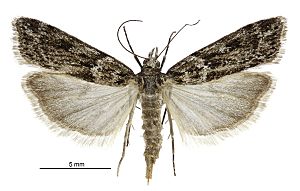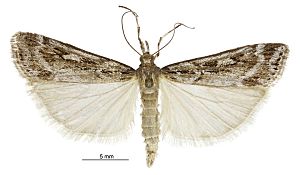Eudonia cyptastis facts for kids
Quick facts for kids Eudonia cyptastis |
|
|---|---|
 |
|
| Female | |
 |
|
| Male | |
| Scientific classification | |
| Kingdom: | |
| Phylum: | |
| Class: | |
| Order: | |
| Family: | |
| Genus: |
Eudonia
|
| Species: |
E. cyptastis
|
| Binomial name | |
| Eudonia cyptastis (Meyrick, 1909)
|
|
| Synonyms | |
|
|
Eudonia cyptastis is a small moth that belongs to the Crambidae family. It was first described in 1909 by a scientist named Edward Meyrick. This special moth can only be found in New Zealand, meaning it is endemic there.
Contents
About the Eudonia cyptastis Moth
The Eudonia cyptastis moth is a unique insect found only in New Zealand. It is part of a large group of moths known as the Crambidae family. These moths are often called "snout moths" because some have a snout-like mouthpart.
What Does It Look Like?
This moth has a wingspan of about 17 to 20 millimeters. That's roughly the size of a small coin!
- Forewings: The front wings are mostly brownish-gray. They can have different amounts of white mixed in, making them look a bit patchy.
- Hindwings: The back wings are a lighter, pale brownish-gray. They might have a slight yellow tint. The edges of these wings are also brownish-gray.
When Can You See Them?
Adult Eudonia cyptastis moths have been seen flying around in November. This suggests they are active during the late spring or early summer in New Zealand.
Who Discovered This Moth?
The Eudonia cyptastis moth was officially described in 1909 by Edward Meyrick. He was a famous British entomologist, which means he studied insects. Meyrick described many different species of moths during his career.

